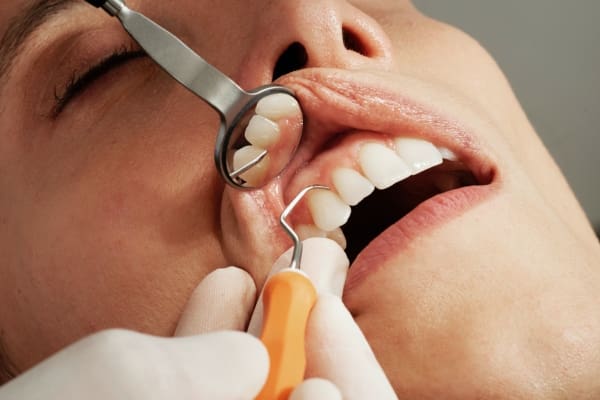
Dental problems are common and can cause a great deal of discomfort, pain, and embarrassment. It is important to understand the most common dental problems and how to prevent them. In this article, we will discuss the top 10 most common dental problems and provide tips on how to avoid them.
The Top 10 Most Common Dental Problems
Maintaining good oral health is essential for overall health and well-being. However, many people experience dental problems that can cause discomfort, pain, and even tooth loss. Here are the top 10 most common dental problems and how to prevent them:
Cavities
Cavities, also known as tooth decay, are one of the most common dental problems. They occur when bacteria in the mouth produce acid that erodes the tooth enamel. Symptoms include tooth sensitivity, pain, and visible holes or pits in the teeth. To prevent cavities, brush your teeth twice a day with fluoride toothpaste, floss daily, and avoid sugary and acidic foods and drinks.
Gum Disease
Gum disease, also known as periodontal disease, is a bacterial infection that affects the gums and bones that support the teeth. Symptoms include red, swollen, and bleeding gums, bad breath, and loose teeth. To prevent gum disease, brush your teeth twice a day, floss daily, and visit your dentist regularly for cleanings and check-ups.
Tooth Sensitivity
Tooth sensitivity is a common dental problem that causes pain or discomfort when eating or drinking hot or cold foods and beverages. It can be caused by tooth decay, gum disease, or tooth erosion. To prevent tooth sensitivity, brush your teeth gently with a soft-bristled toothbrush and use toothpaste designed for sensitive teeth.
Toothaches
Toothaches are a common dental problem that can be caused by tooth decay, gum disease, or tooth damage. Symptoms include pain, swelling, and sensitivity to hot or cold foods and beverages. To prevent toothaches, brush your teeth twice a day, floss daily, and visit your dentist regularly for cleanings and check-ups.
Bad Breath
Bad breath, also known as halitosis, can be caused by poor oral hygiene, gum disease, or certain foods and beverages. To prevent bad breath, brush your teeth twice a day, floss daily, and use mouthwash. Avoid smoking and foods that can cause bad breath, such as garlic and onions.
Oral Cancer
Oral cancer is a serious dental problem that can be caused by tobacco use, excessive alcohol consumption, and exposure to the human papillomavirus (HPV). Symptoms include mouth sores, white or red patches in the mouth, and difficulty swallowing or speaking. To prevent oral cancer, avoid tobacco and excessive alcohol consumption, practice safe sex, and visit your dentist regularly for check-ups.
Tooth Erosion
Tooth erosion is a dental problem that occurs when the tooth enamel is worn away by acid. It can be caused by acidic foods and drinks, acid reflux, and certain medications. Symptoms include tooth sensitivity, discoloration, and rounded teeth. To prevent tooth erosion, avoid acidic foods and drinks, brush your teeth gently with a soft-bristled toothbrush, and use toothpaste designed for sensitive teeth.
Tooth Damage
Tooth damage is a common dental problem that can be caused by injury, decay, or wear and tear. Symptoms include pain, sensitivity, and visible chips or cracks in the teeth. To prevent tooth damage, wear a mouthguard when playing sports, avoid chewing on hard objects, and visit your dentist regularly for check-ups.
Tooth Loss
Tooth loss is a serious dental problem that can be caused by gum disease, tooth decay, or injury. It can lead to difficulty eating and speaking, as well as changes in facial appearance. To prevent tooth loss, practice good oral hygiene, visit your dentist regularly for check-ups, and avoid smoking and excessive alcohol consumption.
Bruxism
Bruxism, also known as teeth grinding, is a dental problem that can cause tooth damage and jaw pain. It can be caused by stress, anxiety, or an abnormal bite. Symptoms include worn-down teeth, jaw pain, and headaches. To prevent bruxism, manage stress and anxiety, wear a mouthguard at night, and visit your dentist regularly for check-ups.
In conclusion, maintaining good oral health is essential for overall health and well-being. By understanding the top 10 most common dental problems and how to prevent them, you can take steps to keep your teeth and gums healthy for a lifetime.
Common Dental Problems in Children
Children can face a variety of dental problems that can lead to discomfort and even long-term damage if left untreated. Here are some of the most common dental problems in children:
Tooth Decay
Tooth decay, also known as dental caries, is the most common dental problem in children. It occurs when bacteria and plaque buildup on the teeth, leading to the decay of tooth enamel. Poor oral hygiene, sugary diets, and inadequate fluoride exposure can all contribute to the development of this problem. Fluoride varnish and toothpaste can help prevent cavities, as can regular brushing and flossing.
Gum Disease
Gum disease, also called gingivitis, is an inflammation of the gums that can lead to pain, swelling, and bleeding. Poor oral hygiene is a primary cause of gum disease in children. Encouraging good oral hygiene habits, such as regular brushing and flossing, can help prevent gum disease.
Malocclusion
Malocclusion is a misalignment of the teeth and jaws that can lead to speech problems, difficulty chewing, and other issues. Genetics can play a role in the development of malocclusion, but environmental factors such as thumb-sucking and pacifier use can also contribute. Early orthodontic treatment can help correct malocclusion and prevent further problems.
Tooth Eruption Problems
Tooth eruption problems occur when teeth do not come in properly or at the right time. This can lead to overcrowding, misalignment, and other issues. Good oral hygiene and regular dental check-ups can help detect and address tooth eruption problems early on.
Tooth Sensitivity
Tooth sensitivity can occur when the tooth enamel wears down or when the gums recede, exposing the sensitive inner layers of the tooth. This can lead to pain and discomfort when eating or drinking hot or cold foods and beverages. Good oral hygiene and avoiding acidic or sugary foods can help prevent tooth sensitivity.
Preventing dental problems in children requires a combination of good oral hygiene habits, a healthy diet, and regular dental check-ups. Encouraging children to brush and floss regularly, limiting sugary and acidic foods and drinks, and ensuring adequate fluoride exposure can all help prevent common dental problems.
Common Dental Problems in Older Adults
As we age, our dental health can become more challenging to maintain. Several dental problems are more common in older adults than in younger people. Here are some of the most prevalent dental issues in older adults and how to prevent them.
Dry Mouth
Dry mouth is a common problem in older adults, and it can lead to tooth decay and gum disease. Dry mouth can be caused by several factors, including medications, radiation therapy, and certain medical conditions. To prevent dry mouth, it’s essential to stay hydrated by drinking plenty of water. You can also try chewing sugarless gum or sucking on sugarless candy to stimulate saliva production. Avoid alcohol, tobacco, and caffeine, as they can make dry mouth worse.
Tooth Loss
Tooth loss is another common problem in older adults, and it can be caused by several factors, including gum disease, tooth decay, and injury. Missing teeth can make it difficult to chew food, speak clearly, and can affect your appearance. To prevent tooth loss, it’s essential to practice good oral hygiene, including brushing twice a day, flossing daily, and visiting your dentist regularly. Your dentist may also recommend treatments such as dental implants or dentures to replace missing teeth.
Periodontal Disease
Periodontal disease, also known as gum disease, is a prevalent dental problem in older adults. It’s caused by bacteria that infect the gums and can lead to tooth loss if left untreated. Symptoms of periodontal disease include red, swollen, or bleeding gums, bad breath, and loose teeth. To prevent periodontal disease, it’s essential to practice good oral hygiene and visit your dentist regularly for cleanings and checkups.
Oral Cancer
Oral cancer is a serious condition that can affect anyone, but older adults are at a higher risk. Oral cancer can develop in the mouth, throat, or tongue, and it can be caused by several factors, including tobacco use, alcohol consumption, and exposure to the sun. Symptoms of oral cancer include mouth sores, lumps or bumps in the mouth, difficulty swallowing, and changes in voice. To prevent oral cancer, it’s essential to avoid tobacco and limit alcohol consumption. Regular dental checkups can also help detect oral cancer early.
Dental Emergencies
Dental emergencies can happen to anyone, but older adults may be more susceptible due to their dental health. Common dental emergencies include toothaches, broken or chipped teeth, and knocked-out teeth. To prevent dental emergencies, it’s essential to practice good oral hygiene and visit your dentist regularly. If you experience a dental emergency, contact your dentist right away for advice and treatment.
Treatment for Dental Problems
When dental problems arise, it is important to seek treatment promptly to prevent further damage and pain. The type of treatment recommended will depend on the specific dental problem and its severity. Here are some common treatments for dental problems:
Fillings
Fillings are used to repair teeth that have been damaged by decay or trauma. The dentist will remove the damaged portion of the tooth and fill the cavity with a material such as amalgam, composite resin, or porcelain.
Crowns
Crowns are used to restore teeth that have been severely damaged or weakened. A crown is a cap that is placed over the tooth to protect it and restore its shape and function. Crowns can be made from a variety of materials, including metal, porcelain, and ceramic.
Root Canal
A root canal is a procedure used to treat a tooth that has become infected or inflamed. During a root canal, the dentist will remove the infected or inflamed pulp from the tooth and fill the space with a material to prevent further infection.
Dental Implants
Dental implants are used to replace missing teeth. The implant is a small metal post that is surgically implanted into the jawbone. A crown is then attached to the implant to replace the missing tooth.
Teeth Whitening
Teeth whitening is a cosmetic procedure used to remove stains and discoloration from the teeth. There are a variety of teeth whitening options available, including in-office treatments and at-home kits.
How to Prevent Dental Problems
Preventing dental problems is the best way to keep your teeth and gums healthy. Here are some simple steps you can take to prevent dental problems:
Good Oral Hygiene
Good oral hygiene is the foundation of dental health. Brushing your teeth twice a day with fluoride toothpaste and flossing daily can help remove plaque and prevent tooth decay and gum disease. You should also use an antiseptic mouthwash to kill bacteria that cause bad breath.
Regular Dental Check-Ups
Regular dental check-ups are essential for maintaining good dental health. Your dentist can detect and treat dental problems early, before they become more serious and more expensive to treat. You should visit your dentist at least twice a year for a check-up and cleaning.
Healthy Diet
A healthy diet is important for dental health. Foods that are high in sugar and acid can erode tooth enamel and cause cavities. Eating a balanced diet that is rich in vitamins and minerals can help keep your teeth and gums healthy.
Avoiding Harmful Habits
Harmful habits such as smoking and excessive alcohol consumption can damage your teeth and gums. Smoking can stain your teeth and increase your risk of gum disease and oral cancer. Excessive alcohol consumption can also increase your risk of oral cancer. Grinding and clenching your teeth can also cause tooth damage and jaw pain.
Taking care of your dental health is an important part of overall health and well-being. There are many common dental problems that people face, but by taking preventative measures, you can avoid many of these issues.
In conclusion, brushing your teeth twice a day with a fluoride toothpaste, flossing daily, and visiting your dentist regularly for checkups are all important steps to maintaining good dental health. Additionally, avoiding sugary and acidic foods and drinks, quitting smoking, and wearing a mouthguard during sports can also help prevent dental problems.
If you do experience dental problems, seeking prompt treatment for dental problems is important to prevent further damage and pain. The type of treatment recommended will depend on the specific dental problem and its severity. Treatments such as fillings, crowns, root canals, dental implants, and teeth whitening can help restore the health and appearance of your teeth. Ignoring dental issues can lead to more serious problems down the line, including tooth loss and gum disease.
By taking preventative measures and seeking treatment when necessary, you can ensure that your teeth and gums stay healthy for years to come.



